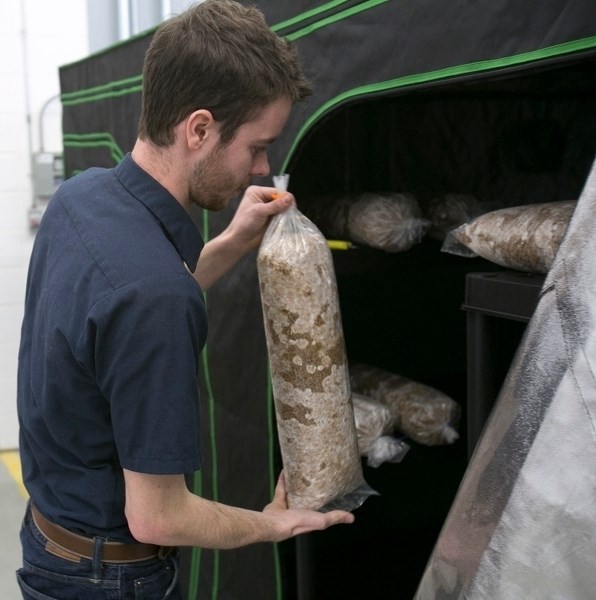An Olds college student's prize-winning idea to make use of spent grains from the brewery process has huge potential, he says.
This past Thursday, Alex Villeneuve, 20, a first-year brewmaster student, took top prize in the TecEdmonton VenturePrize Business Competition.
Villeneuve has come up with a way to utilize spent grains from the brewery process to grow high-protein mushrooms for restaurants and farmers markets. The grain can also be refined to be sold to farmers as feed for their animals. Also, they can be used to clean up diesel and oil spills.
He has formed a company, Ceres Solutions Ltd.
Villeneuve says as he searched for a name for the company “I was kind of inspired by Roman gods. Ceres is the Roman goddess of the grain harvest, which is kind of fitting.”
Before taking the brewmaster course, Villeneuve worked in a restaurant for about three years, learning to be an apprentice chef.
“I kind of got really interested in beer and food pairings, and wine and food pairings, and Olds College was just the next step,” he says.
That history and a background in environmental sustainability gave him the idea for his company.
“I have a kind of a background in permaculture, which is a sustainable agriculture certificate, so I've designed some community gardens and I've grown oyster mushrooms before,” he says.
Villeneuve is currently conducting research to work out the kinks in the process in space provided by Olds College.
“When we brew, we take grains – we nail them; so we crush them up and we put them in this water that's a specific temperature. And then from there, the sugars get extracted and then that's all we do with the grain. So there's this massive amount of cellulose waste,” Villeneuve says.
Villeneuve's company minimizes the bacteria and takes out the excess water in those spent grains to create a perfect environment to grow the high-protein mushrooms.
The mushrooms are grown in a zipped tent-like structure that keeps the environment just right.
“They're a little bit of a higher protein content. Essentially, you are what you eat and we're kind of feeding them the cream of the crop, as far as substrates go – as far as soil goes. Normally what people grow them in is straw – stuff like that,” he says.
He says until now, brewing companies – especially the smaller ones – have been relying on waste contractors to haul that waste away. But that service isn't always reliable, he claims.
“What they're doing right now is they're paying about $2,000 a month for a composting company to come in, which is just insane when you're a tiny little brewery,” he says.
He says his company can move those grains for a fee of maybe $500 or $600, just covering shipping costs.
Villeneuve says so far, eight of the 21 breweries in Alberta are interested. He's confident he can get interest from breweries across Canada, perhaps North America, in the future.
“Every single one of them has been ecstatic that there's this kind of upcoming thing.”
Similarly, Villeneuve is working on removing the bacteria in the spent grain that would be harmful to livestock so that material can be sold to farmers.
He also discovered that the grains, as they decompose to become rich soil, are also perfect for bioremediation (reclaiming the environment by absorbing toxic hydrocarbons, like spilled diesel, gas or oil).
“A couple of the studies we've been looking at, and we're trying to replicate here with my strains, have shown (that) diesel-contaminated plots of soil can be broken down to the point where they can be used in landscaping and along highways and stuff. So it's pretty incredible,” he says.
Villeneuve got the idea for the project last September and has been working on it ever since – around school hours, occasionally receiving some help from his dad and brother.
He started up the company in November, because he found out he needed one in order to get grants for the project, and to get his foot in the door when selling his product to restaurants, etc.
“We've got quite a few different markets: we've got the mushrooms, the permaculture and reforestation, enriched feed and bioremediation. So there are a lot of options,” Villeneuve says.
Villeneuve didn't have great expectations to even get a chance at the top prize in the TecEdmonton VenturePrize Business Competition.
But then he got some encouraging news – he was a finalist.
“I got an email and a phone call that said, ‘you're one of the top three in Alberta,'” he says.
"We've got quite a few different markets: we've got the mushrooms, the permaculture and reforestation, enriched feed and bioremediation. So there are a lot of options." ALEX VILLENEUVE OLDS COLLEGE STUDENT



